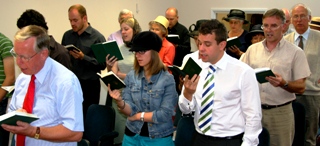In these times when there are so many arguing about religion and about what faith would be the right faith or what would be the right way to worship God it is not bad to consider what the people at the time of the Jewish master teacher, Jeshua, thought.
Most of the time those seeing and hearing rebbe Jeshua belonged to the Jewish faith like the master himself. Though few belonged to Jeshua’s religious group because some considered the Essenes as a sect and several also came to see Jeshua his followers also as a sect. Being a child of Joseph and Miriam (Mary/Maria) from the tribe of David, Jeshua and his siblings where brought up in the very religious traditions of the Essenes, to which Miriam belonged. As such Jeshua received a strict thorough education in Torah knowledge and was very well aware what was written in all the different scrolls.
An other person very well educated in Jewish theology was Saul. As a devout worshipper of the God of Israel and connected to the synagogue and the priests in Jerusalem, he was convinced those teachings of that man where blasphemous and had to be stopped. He as a big fighter for Jehovah God went against those followers, until the day he was struck by lightening, feeling Jesus close to him and being blinded by the Power of God because he had become a satan or adversary of God, more than Peter who Jesus also had called a satan.
At first the majority of followers of Jeshua where Jews, but having many Romans around and travellers of other religions or not at all believing in a god or in God, some of them became attracted by the words of the rebbe and his talmidim. Several got in the ban of the doctrines of that man his group and wondered if they could join them. But having come at a certain age they did not like so much to undergo a circumcision. At the other hand lots of the Jews in the group where very concerned about the goyim entering their group and having them to allow in their synagogues. We can image the many discussions going on about the Jewish rules either to be followed by those who came into the group or having them to be free of those mitzvot. Doctor Luke tells about all the internal discussions and arguments in his book the Acts of the apostles.
In 330 CE “church father” Epiphanius of Salamis provided a detailed description of the new faith in Jeshua which started to spread over many regions, by the Netzerim in Panarion 29:
“We shall especially consider the heretics who call themselves Nazarenes; however they are simply complete Jews.
They use not only the New Testament but the Old Testament as well, as the Jews do…
They have no different ideas, but confess everything exactly as the Law proclaims it and in the Jewish fashion – except for their belief in Messiah, if you please! For they acknowledge both the resurrection of the dead and the divine creation of all things, and declare that God is one, and that his son is Yeshua the Messiah.
They are trained to a nicety in Hebrew; for they, like the Jews, read the whole law-Torah , then the Prophets. They differ from the Jews because they believe in Meshiach and from the Christians in that they are to this day bound to the Jews rites, such as circumcision, the Shabbat, and other ceremonies . Otherwise, this sect of the Nazarenes thrives most vigorously in the state of Berea, Coele-Syria, in Decapolis, around Pella, and in Bashan. After they departed from Jerusalem, they made their start from here, as all the disciples dwelt in Pella, having been warned by Meshiach to depart Yerushalayim and emigrate because of imminent danger”
Up to today the matter still bothers many, first of all because several are seriously concerned now about those who call themselves Christian but do not adhere to Jeshua his writings and even worship an other god than Jeshua, namely Jesus and his co-gods (god the father and god the holy spirit). For Jews wanting to accept Jeshua or Jesus as the Messiah this is a serious problem, because they would never want to be confused with polytheist Christians. Most of the Jews, even today, do not want to give up their Jewishness, certainly because they consider themsleves still to be part of the Chosen People of God, Israel Gods People. Thàt they do not want to give up. It would be stupid to give that up or to loose our identity with Gods People.
When we look at the history of Christianity we can see that, before the time it was transposed to Christendom and the dogmatic teachings of the trinity, already soon there came a major controversy in early Christianity concerning the role of Jewish law and traditions. As most of the first converts were Jews, some felt that the Mosaic Law and covenantal signs, such as circumcision, were still important. While others where convinced that their rebbe brought the message of God that from now on their religion had to be open to both Jews and Gentiles. Some contended that converts first had to become Jews in order to become Christians. Others considered the outward signs of Judaism to be unnecessary for Christian life.
It is known that at the beginning most of them, like Saul or Paul, how he further became known, that “Much in every way“ was the advantage of the Jew and the value of circumcision. (Romans 3:1). Several thought by allowing goyim to enter their community and not having them to subject to the same rules they where overthrowing the Law by that notion of faith? But for Paul that was by no means so. On the contrary, he felt that they upheld the Law” (Romans 3:31).
Everybody had to know that all those who just relied on works of the law were under a curse (Galatians 3:10), because we all should know that no one is justified before God by the law (Galatians 3:11).
The convert Paul went even so far to say that circumcision even did not count for anything, but that Jeshua had taken care of a new path and had opened the gates of a new creation which is everything. (Galatians 6:15). For him it had become clear that no human being will be justified in God’s sight by works of the law, since through the law comes knowledge of sin (Romans 3:20). But that does not mean that the Law would be sin. By no means (Romans 7:7).
All that want to become a follower of Jeshua, Paul argumented had to recognise that the Law is and shall stay holy, and that the mitzvah or commandment is holy and just and good for all of us (Romans 7:12). Though he also said that to the Israelites belongs the sonship, the glory, the covenants, the giving of the Law, the Temple, and the promises. To them belong the patriarchs and of their race, according to the flesh (Romans 9:4). Jewishness can not be taken away by man, because it is entitled by God, engraved in the hearts of those who descent from the tribes chosen by God and protected by God.
Today there are lots of people who think that God has rejected His own people but Paul already warned for such false thinking and said that the Elohim has not rejected His people (Romans 11:1) and told even that
“All Israel will be saved” (Romans 11:26).
As such Jews still can bear that precious hope. When they accept Jeshua as the Messiah they do not have to give up their Jewishness, but they also shall have to accept that the goyim or those who where at first atheist, heathen or people from an other faith, that they now too can come to God by the way of Jeshua, and can call the Elohim Hashem Jehovah also their Father or Abba.
Those Jews at the time of the first followers of Jeshua came to accept the non-Jews and did not impose their laws unto them – which was not always an easy thing to do for them. In our time, we too have to be open for the non-Jews who come to accept the Nazarene rebbe Jeshua as their Saviour. But we too have to accept that those goyim become part of the Body of Christ without having to undergo all the obligations a Jew has to undergo.
Nobody may come to think the Law would have become opposed to the promises of God. Certainly not! (Galatians 3:21).
Although Paul preached justification on the basis of faith in Christ, he was himself a Pharisee and addressed the role of Jewish traditions and the status of Israel in the new covenant.
In “Paul’s Contradictions: Can They Be Resolved?” Princeton Professor John Gager looks at how Paul seems to be at war with himself on the subject of Israel. Is there a way out of his contradictions?
Yes, the author argues, but only if we first get past misconceptions about Paul that date to the earliest stages of Christianity — even to Paul’s own times.
Though when reading the book by John Gager, one must know that Paul is not the father of Christian anti-Judaism, like the great German historian Adolf Harnack wants Christians to believe. He writes:
“It was Paul who delivered the Christian religion from Judaism … It was he who confidently regarded the Gospel as a new force abolishing the religion of the law.”
Since the time of the early church fathers until recent decades, all interpreters of Paul have read him from the perspective of the triumph of Christianity, after the decisive break between Christianity and Judaism. The reigning Christian view of Judaism during this entire period has been that the Jews have been superseded as the chosen people of God by the Christians (or Christianity), that the Jews are no longer the bearers of God’s promise of salvation and that their only hope for salvation lies in becoming Christian. In this hermeneutic, it follows that Paul, too, with his canonical status, must have held to this dominant Christian view of Judaism. And this is exactly how Paul has been read throughout Christian history. Not just 80 or 90 or even 99 percent of the time, but 100 percent of the time, without exception — that is, until recently, when a few maverick scholars began not only to question that image but to reject it altogether. {Paul: Jewish Law and Early Christianity}
Biblical scholar Ben Witherington III counters the contradiction in “Laying Down the Law: A response to John Gager.” He questions Gager’s idea that Paul preached the gospel of Jesus Christ for Christians alone by asking whether his message was intended for both Jews and Christians.
Today we can see that there is a growing amount of Jews who are proud to be Jew but also want to be proud to be a follower of the Jew Jeshua, whom they often consider to be one of their own, a child of Israel. In Christendom we find that the majority are trinitarians, but may not forget that there are loads of non-trintiarian denominations as well. There are certain groups which have a similar name but differ from their belief in the trinity or in One True God. As such we can find the Nazarenes, of which some are tinritarians and others still believe the same doctrines as their first counterparts. The Nazarene Friends up to a few years ago where very active non-trinitarian Christians, but by becoming older and dying lots of ecclesiae saw their numbers reduce.
The most well known non-trinitarian groups may be the Bible Students and Jehovah’s Wtinesses, with all their teardowns or torn groups. Lots of those groups not so much respecting by God given days to celebrate or to remember certain events. Though it must be said several bible student groups and Jehovah’s Witness knowing very well that according to Jeshua and his heavenly Father, according to the Scriptures all people of God shall have to remember 14-15 Nisan or Passover (Pesach).
Some Christians also have come to the conclusion that perhaps not so many laws are abandoned as so many Christians do believe. They came to understand that Jeshua was a Jew and held to the Jewish traditions. Certain Jewish elements they now also want to see incorporated in their way of life, as a sign of being under that Jewish master teacher.
Christians who do not want to be looked at, as the same lot of trinitarian Christians, or who want to feel and show more a Jewish connection can as Messianic Christians show their love for Jeshua and his teachings by calling themselves also a Jeshuaist.
Jeshuaist do not expect converts to the faith in Jeshua to be or to become a Jew or to follow all the Jewish laws, though they want them to recognise the Jewish position of Jeshua and the Judaic followers of Jeshua, which means that certain ways of worship, songs and prayers and making church or having meetings shall be as in the first century or in the tradition of the early Christians, forming a brotherhood with acceptance of differences, but considering all as one part united under Christ and not a human organisation which would control and regulate everything.
For Jews who accept Jeshua as their Messiah and for those who prefer to see a Messianic Judaism the Jeshuaists offer a solution. With the title or name Jeshua-ist one can give honour to Jeshua and show the connection with the Jewish rebbe as well can one avoid the confusion with trinitarian Messianics or trinitarian Christians, making it clear to be a Messianic non-trinitarian Jew.

+
You may be interested in reading:
- Our life depending on faith
- As there is a lot of division in Christendom there is too in Judaism
- Sabbatai Zevi (Jewish Convert To Islam)
- Forgotten History-The Jews from Geleen 1940-1944.
- Jewish and Christian traditions of elders
- Today’s thought “Ability to circumcise your heart” (May 13)
- Jeshuaists or Followers of Jeshua
- Who is a Jeshua-ist
- Who is or can be a Jeshuaist
- Why to become a Jeshuaist
- Availability of Jeshuaists on Facebook
++
Read the above mentioned articles from the Biblical Archaeology Society and more in the FREE eBook Paul: Jewish Law and Early Christianity. Featuring articles taken from Bible Review and Biblical Archaeology Review, this eBook considers the relevant writings of Paul and brings to light some of the difficult theological issues for Jews and Christians that persist to this day.
Paul: Jewish Law and Early Christianity
+++
Further reading
- Religions and Mainliners
- Israel must honor God or the Rule of Law is meaningless
- The Real Wall Problem: When Will Diaspora Jews Fight For Palestinians?
- “Qualitavely Jews are not a minority”
- Nazarene Jews Through Out History
- Who is Israel? And What Role, If Any, Does She Play in God’s Kingdom?
- The Temple Connection
- Where is the Church that Christ built?
- The Church & The Old Testament Law
- Christians Above the Law?
- Why The Bible Is Divine: Christology
- Jewish Halakha and the Rabbinic Authority in the Messianic World
- The Not Left, Not Right, but UP Movement
- From Rome to Corinth, and Back Again: Reclaiming What Was Taken from Us
- Eleven Steps to Live a Messianic Nazarene Jewish life
- The straight line connecting Donald Trump’s new tallit to “Christians for Islam,” and a best practices suggestion
- Something great is happening in Israel
- A sort of “sing along” songs with Messianic Jews in Israel
- Is It A “Sign”?
- Christ is risen! Kristus är uppstånden! Baruch HaBa Beshem Adonai!
- Books on examples of Jewish evangelism in Israel
- The great tree of Moreh
- Rabbinical court rules against Jewish marriage rites for Messianic Jews
- Sabbath as a Bride
- Shalom in Psalms
End Times Series: Pastor Jimmy Evans
- Kiss the Son…
- On an Irish Cliff
+++

















































































